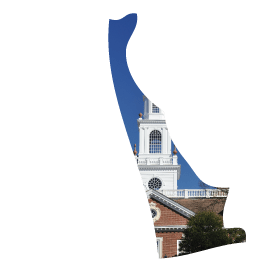Alternate Route Preparation: Delaware
Expanding the Pool of Teachers Policy
Analysis of Delaware's policies
Delaware offers its alternate route candidates streamlined preparation that meets the immediate needs of new teachers.
Prior to taking responsibility for a classroom, all Alternative Route for Teacher Licensure and Certification (ARTC) candidates must complete a seminar/practicum of no fewer than 120 clock hours. This includes professional development and introduction of basic teaching skills through a supervised teaching experience. While teaching, an additional 200 hours of coursework in the areas of curriculum, student development and learning, and classroom management is also required. This coursework consists of five graduate-level courses completed through the University of Delaware.
Intensive induction is provided during the first 10 weeks of school. Mentoring is provided for at least 30 weeks and may continue for up to two years. Four cycles of mentoring are available, including Creating a Classroom Environment, Designing Instructional Experiences, Assessment for Student Learning and Professional Growth Planning. During the first two cycles, new teachers are provided with time to talk with colleagues, observe veteran teachers and reflect on their performance, in addition to meeting with their mentors. Cycles three and four involve a learning-team format and preparing a professional growth plan.
ARTC candidates have up to three years to earn certification, but ARTC courses are designed to be completed within 12-18 months.
The Teach For America (TFA) program requires candidates
to complete a five-week intensive training program, which includes
practice teaching, during the summer. Coursework is focused on
leadership, instructional planning and delivery, classroom management,
diversity, learning theory and literacy development. Throughout the
two-year program, TFA corps members receive one-on-one coaching.
The Delaware Teaching Fellows complete a six-week intensive training institute that includes a practice-teaching assignment, sessions designed to delve into a curriculum focused on student standards, foundations of
teaching, classroom management and other skills necessary to become an
effective teacher in a high-need school.
Recommendations for Delaware
State response to our analysis
Delaware stated that "each alternative route program is structured differently. While the clock hour requirements and other requirements hold constant under state code, the means by which candidates obtain them vary." The state also asserted that all new teachers participate in the state's new teacher-mentoring program/requirements.
Select another topic
Delivering Well Prepared Teachers
- Admission into Preparation Programs
- Elementary Teacher Preparation
- Elementary Teacher Preparation in Reading Instruction
- Elementary Teacher Preparation in Mathematics
- Middle School Teacher Preparation
- Secondary Teacher Preparation
- Secondary Teacher Preparation in Science
- Secondary Teacher Preparation in Social Studies
- Special Education Teacher Preparation
- Assessing Professional Knowledge
- Student Teaching
- Teacher Preparation Program Accountability
Expanding the Pool of Teachers
Identifying Effective Teachers
- State Data Systems
- Evaluation of Effectiveness
- Frequency of Evaluations
- Tenure
- Licensure Advancement
- Equitable Distribution

